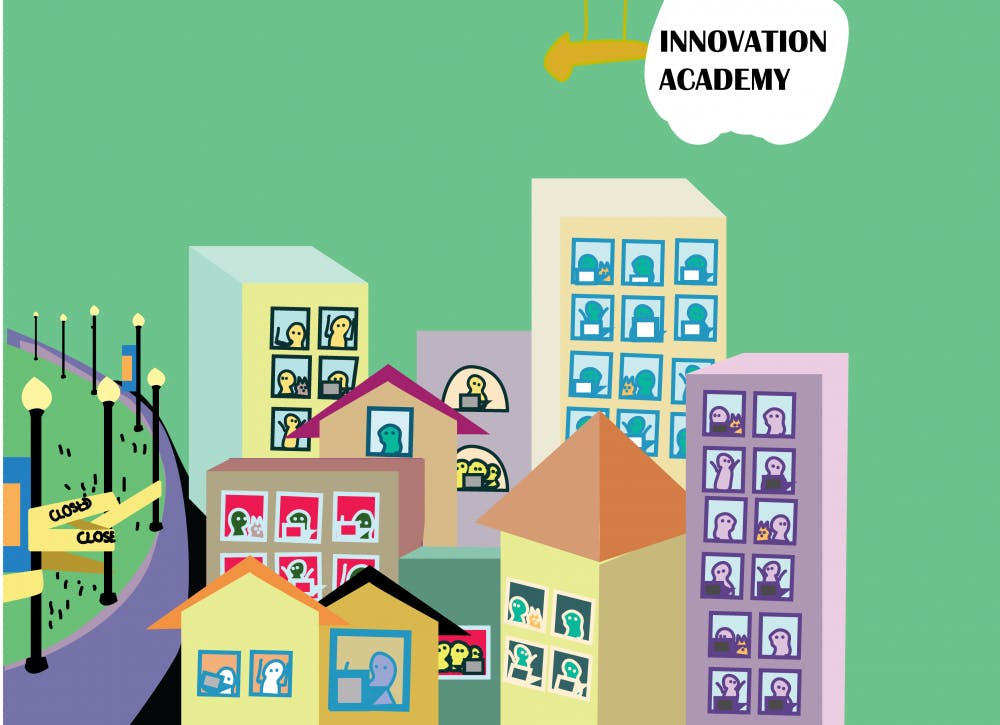Paula Peñaranda moved into Beaty Towers in January to begin her freshman year at UF. Two months later, she was sent home.
The 18-year-old computer science student from Boca Raton is part of UF’s Innovation Academy, an undergraduate program that encourages student creativity, leadership, entrepreneurship and ethics through the school’s innovation minor, according to the IA website.
Typically, incoming IA students start their first semester of college almost a year after being accepted and take in-person courses during Spring and Summer. Students can petition to take courses in the Fall, but they are only offered online, according to the website.
However, transitioning to remote learning as a result of COVID-19 has caused both of Peñaranda’s in-person semesters to be moved in front of a screen at home, she said.
“The excitement of finally getting to start college and get to it in January, and then two months later for it to just be stopped, was very disappointing,” Peñaranda said.
IA students like Peñaranda now face nearly an entire academic year of online learning after UF transitioned in March and later announced all Summer classes will be remote, too.
Although Peñaranda only lived on-campus for three months, the required freshman IA housing in Beaty Towers helped her adapt to college life, she said. But because she had to go home before the semester ended, she added that she feels like she missed out on important first-year experiences.
“I remember my first night there,” Peñaranda said. “We went around and said ‘Hi’ to all of our new neighbors, and it was very cool to be able to be so close to people that were also going through the same program you're going through.”
Now, she said, taking classes online and at home has been difficult to get used to, especially without the support from fellow students.
“Most of us didn't have the same major, but since we all have the same minor, there were some things that we could relate to,” Peñaranda said.
Brian Ardavin, a 21-year-old psychology senior from Miami and IA student, said he sympathizes with new students who won’t be able to take part in the transformative experience he had during his first years at UF.
Ardavin said IA students develop a sort of camaraderie that other UF programs don’t have. Living in Beaty Towers helps create a space for them to live and learn together, he said.
“We're usually some of the only students on campus during Summer A, and that's a special thing for a lot of us,” Ardavin said.
He said that he is trying to make the most of the online Summer semester, but other students might struggle with the idea of losing part of the IA experience, he said.
As an Innovation Academy Ambassador, Ardavin said he has helped new IA students acclimate to the program. In addition to forming a community in their housing, as students become more involved on campus, they form stronger bonds with other students in the academy, he said.
“We have a lot of clubs that are specific to IA, and they run primarily in the Spring and Summer,” Ardavin said. “With our inability to be able to be on campus, to participate on campus, to do the things that most students would do in the Fall and in the Spring, we kind of don't have those opportunities anymore.”
Ardavin said he is grateful for the IA program's focus on innovation because it has allowed him to learn about teamwork and creativity, which earned him two remote internships this Summer.
Charlie Cummings, an Innovation Academy professor, teaches these skills to students in his Creativity in Action class, the second course in the innovation minor, he said.
While the university has been able to transition all of the academy’s curriculum to an online format, Cummings said, he thinks students will find the course more challenging fully online because it requires them to work together throughout the semester.
In his class, students work in teams to design an original prototype to present at the end of the semester at the IA Catalyst showcase, Cummings said. Catalyst is open to all students at UF, but all Creativity in Action students are required to present their project at the exhibition, he said.
In the past, students set up their posters and prototypes on a table and judges walked around the event and interacted with the students, he said. At the end, students would win recognition like “The Best Prototype Award” or “The Judges Award.”
“It's a really important event because they're taking their idea and putting it out in the public,” Cummings said.
Cummings said the IA has been working on a way to host the event online. However, he said part of the learning experience is lost when there is no face-to-face interaction.
“We build chemistry with students, just having discussions, and there's a lot of in person interaction that's really important,” Cummings said. “It's much harder to do that through Zoom.”
Peñaranda said she will be taking Cummings’ course during Summer B. Catalyst will certainly be a different experience for students this year, she said, but it could also add a learning component that past students didn’t face.
“Since we are Innovation Academy, we have to adapt quickly to our surroundings, despite what they may be,” Peñaranda said.
Contact Nicole at nrodriguez@alligator.org. Follow her on Twitter at @_nrodriguez99.
Innovation Academy students now face nearly an entire academic year of online learning.






